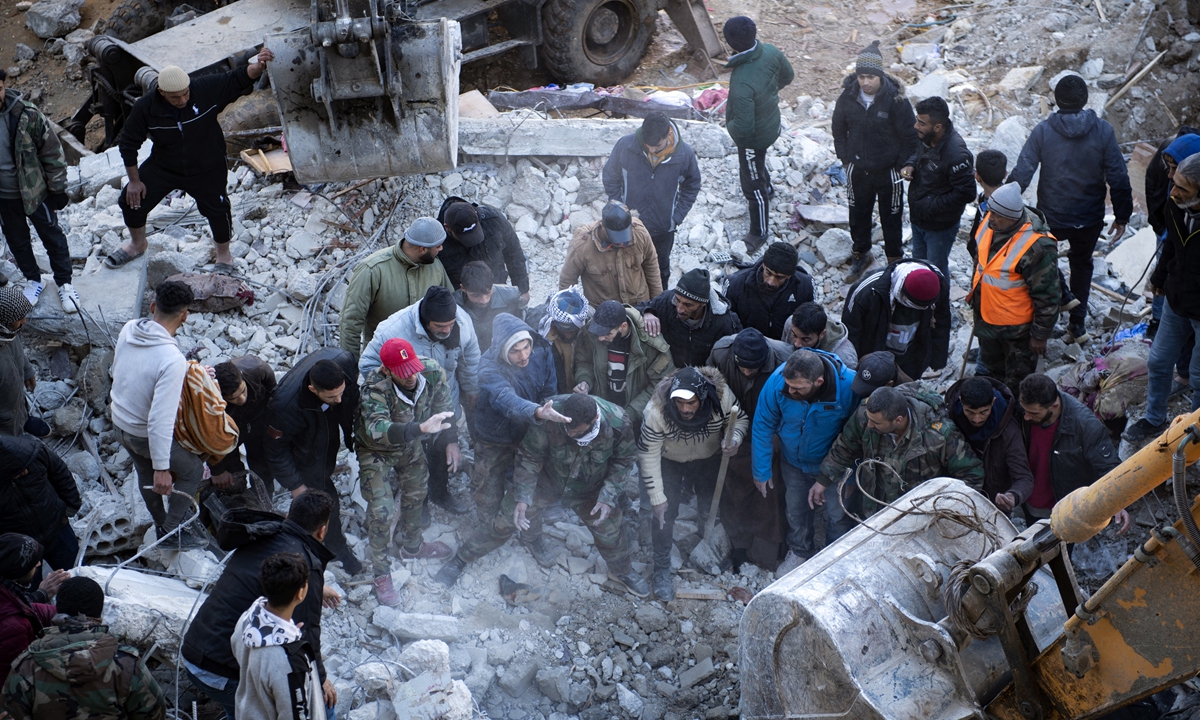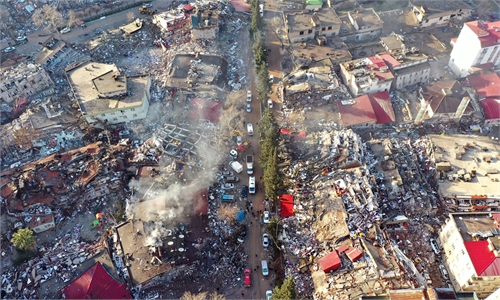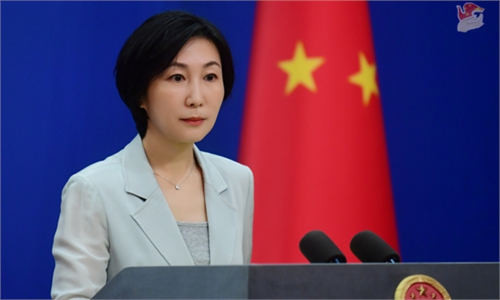
Residents search for victims and survivors amidst the rubble of a collapsed building in the town of Jableh, northwest of the Syrian capital Damascus, on February 8, 2023. Photo: AFP
The devastating earthquakes in Syria and Turkey on Monday have led to the deaths of more than 11,600 and tens of thousands of injured as of press time. With many people still trapped under rubber, rescue efforts have ramped up. It is indeed a race against time.Nonetheless, the sanctions imposed by the US and its allies are hampering relief and rescue work. For instance, due to the blockade and sanctions, there is no fuel even to send aid and rescue convoys. But such a humanitarian disaster is not enough to melt the cold-blooded heart of the US.
At the US State Department press conference on Monday, when a journalist asked why not the US government reached out to the Syrian government, which is the one that runs rescue operations and suggested the US lift the sanctions that have basically suffocated Syria, spokesman Ned Price said that using the earthquake as an opportunity to reach out to the "Syrian regime" would be "ironic."
What the US can offer is just a drop in the sea to the US, but for Syrian people who are facing an uncertain future, it is not only urgent but also life-saving. If the US has any conscience, it shouldn't leave no chance of survival to them at this critical juncture. Syrian lives matter.
Natural disasters and crises have nothing to do with politics. Unfortunately, it is not the case with the US. Just last August, when a fire in a Cuban oil storage facility killed, injured, and displaced Cubans and exacerbated the country's energy crisis and US sanctions were blocking life-saving relief to Cuba, the US only offered "technical support," with no mention of sending specific material aid to Cuba, let alone lifting at least some of the sanctions.
For a long time, Washington has classified Syria as a "dictatorship." The US' narrative of splitting the world into two with so-called dictatorship and democracy actually covers up its true intention of dividing the world according to US interests. Putting ideology and self-interests over humanitarianism, Washington has reversed the order, Wang Guangda, executive director of the China-Arab Research Center on Reform and Development and a professor at Shanghai International Studies University, told the Global Times.
According to Li Haidong, a professor at the Institute of International Relations at the China Foreign Affairs University, the nature of US behavior is to reinforce its hegemony across the world, and in the Middle East region as well. For Washington, dominance and resources are its primary considerations when crafting its security strategies and diplomacy, while humanity and norms are dispensable. This can explain why the US is stealing oil from Syria when imposing sanctions on the country. The bloody fingerprints of US imperialism are on the earthquake disaster of Syria. That the barbaric behavior of the most powerful country in the world blatantly loots the wealth of one of the poorest countries in the world reminds the international community that US behavior must be stopped.
"The UN should play a coordinating role in demanding the US to lift the sanctions on Syria. China and Russia, two permanent members of the UN Security Council, can also launch an initiative to ask Washington to terminate sanctions against Syria. In addition, the US can at least remove the blockade on Syrian earthquake relief and humanitarian aid," noted Wang.
In stark contrast to the US, the Chinese government immediately launched an emergency humanitarian assistance mechanism to provide emergency assistance to Syria. China has decided to provide Syria with 30 million yuan ($4.4 million) in emergency humanitarian assistance, which includes $2 million in cash aid and relief materials urgently needed by Syria. The US diplomatic notion centered on its hegemony falls into pieces in the face of China's efforts to jointly build a community with a shared future for mankind.


